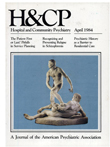Upgrading Psychopharmacology in a Private Psychiatric Hospital
Abstract
We believe that the improvement in drug management of depressive disorder, and the overall improvement of psychopharmacologic practice, can be attributed to the attention the hospital gave to psychopharmacology. Kass and colleagues (10) have also reported improvements in psychopharmacologic practices achieved in their hospital setting by the use of similar internal auditing and teaching conferences. Thus it appears that the use of internal auditing systems, in conjunction with inservice training and one-to-one consultations, may be useful in many psychiatnic settings.
The growth of the field of psychopharmacology has created a considerable need to upgrade training for practicing clinicians who may be generally misinformed about the use of psychotropic medications. The development of a section on psychopharmacology by the hospital provided a creative and acceptable approach to upgrading the level of psychopharmacologic knowledge of the busy clinician. We suggest that use of this approach in other hospital settings might also upgrade the level of medication management.
Access content
To read the fulltext, please use one of the options below to sign in or purchase access.- Personal login
- Institutional Login
- Sign in via OpenAthens
- Register for access
-
Please login/register if you wish to pair your device and check access availability.
Not a subscriber?
PsychiatryOnline subscription options offer access to the DSM-5 library, books, journals, CME, and patient resources. This all-in-one virtual library provides psychiatrists and mental health professionals with key resources for diagnosis, treatment, research, and professional development.
Need more help? PsychiatryOnline Customer Service may be reached by emailing [email protected] or by calling 800-368-5777 (in the U.S.) or 703-907-7322 (outside the U.S.).



